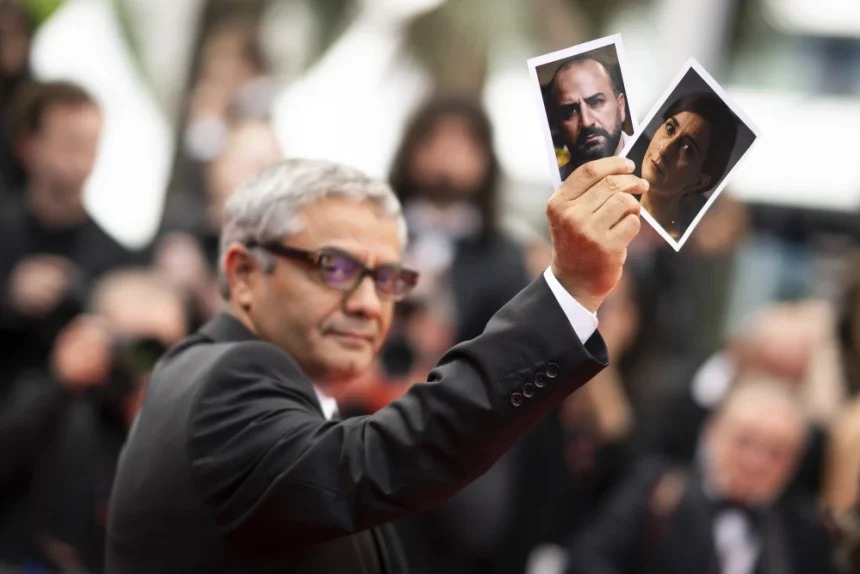Iranian director Mohammad Rasoulof has disclosed that he learned he had been sentenced to eight years in prison while he was completing his latest film, the tense political thriller The Seed of the Sacred Fig. Rasoulof, who has been a tough critic of Iran’s theocratic regime, has been faced with two choices of either fleeing the country or face tough punishment.
Rasoulof said through an interpreter in a Zoom interview from New York that he would not only lose this very active, fertile period for filmmaking. He explained that he would also be transformed into somebody who has to play the role of the sacrificed artist, the victim of censorship. He noted that It was a role he refused to play.
Rasoulof furtively escaped Iran on foot and, after a treacherous journey, took refuge in Germany. He now lives in exile in Europe, far from a government that planned to lock him up because he publicly opposes the socially repressive Islamic Republic, which has ruled Iran with an iron fist since the revolution against the Shah in 1979. Rasoulof can travel through the West — and so can the film he made in virtual secrecy.
“The Seed of the Sacred Fig,” which was first seen in American theatres on Wednesday, centres on a middle-aged man named Iman, an investigator for the Revolutionary Court who lives in Tehran with his devoted wife and their children. The visuals show that when the film begins, Iman is tasked with rubber-stamping snappy sentences for protesters mustering in the streets against the dictatorial state. It’s a mandate that troubles his conscience and puts him at odds with his two liberal-minded daughters. When his work-issued gun goes missing, Iman spirals into paranoia and rage.
Rasoulof designed the film after performing a prison term in 2022, a time that overlapped with popular insurgencies in Iran following the death in police custody of Mahsa Amini, a 22-year-old Iranian Kurdish woman who was arrested for allegedly not wearing a hijab. In writing the screenplay, Rasoulof drew on a “chance encounter” in prison with a senior official who confessed that he was “deeply mortified and embarrassed” by his job and contemplating suicide.
Rasoulof disclosed that he had several ideas that related to the psychology of people like Iman, people who work for the regime in Iran he noted that some of those kinds of individuals were the people who intercepted him during his time and, those who repressed artists through the censorship apparatus. He further noted that he has kept wondering who the people were how they think and act in different ways and the way their psychology has continued to work
Iran’s Islamic Republic has long been determined to suppress disagreement from activists and artists. In the past years, the government have at different times arrested Rasoulof and tried to restrict his travel as a clear penalty for his films and statements condemning state-backed brutality, including a letter he co-signed opposing the government’s response to protests over a 2022 building collapse that killed dozens of people. Officials confiscated his passport in 2017.
In the first months of 2024 when the production of Sacred Fig was taking place Rasoulof was sentenced to prison as well as flogging, a fine and confiscation of his property on the charge of “propaganda activities against the Islamic Republic of Iran. The punishment was confirmed by his lawyer Babak Paknia who has dec decided to relocate to Tehran and confirmed the details of the case.
Iran’s mission to the United Nations did not respond to an email seeking comment.
The Seed of the Sacred Fig is an imagination, but at times it resembles a documentary about recent political restlessness. Rasoulof incorporates existing cellphone footage of the Woman, Life, Freedom activism that swept the nation that year. Iman’s daughters, a watchful 20-something and a free-spirited teenager, view social media clips of demonstrators marching in the streets as well as graphic videos of the brutal police crackdown that followed.
It has been described that Rasoulof and his creative collaborators made the film clandestinely, with the cast and crew afraid of arrest and humiliation from the government. Rasoulof and his technicians used the tiniest tools and only a handful of shooting locations, insistent on evading the strict regulation that were imposed by the government. The paranoia at the heart of the “Sacred Fig” storyline sometimes reflected the circumstances on set, where the appearance of a foreigner could spell defeat for the filmmakers.
Rasoulof stated that it was inescapable. It’s only natural to be afraid when you’re filming that way.
Rasoulof accepted the initial notice about his prison conviction four weeks after the filming project started. He made a choice to continue the project while his lawyer made apeels ready in court. When the appeal was filed the court rejected the appeal and stated that his punishments were after the filming projects had concluded his lawyer narrated. It was expliend that Rasoulof had to take the next decision on what to do. According to the team, he had the phone number of a person he met in prison who had suggested to help him flee Iran if it ever came to that. He made the call.
He explained that he had decided to take a new path as he abandoned all his equipment packed a small bag with just a few clothes, and left the country.
Rasoulof who spoke with just a few details noted that it was a dangerous and horrible trip he took. He noted that the trip involved a lot of walking” through perilous undisclosed territory. Rasoulof who announced his escape in a post on Instagram shared a video of a mountain covered with mountains. He noted that the trip had taken him 28 days after he had found refuge at the consulate in Germany and obtained documents that allowed him to move with relative ease in Europe.
Two weeks after Rasoulof’s daring departure, on May 24, “Sacred Fig” premiered at the 77th Cannes Film Festival in the face of harsh opposition from Iranian leaders. Rasoulof, wandering the Cannes red carpet, showed photos of lead actors Missagh Zareh and Soheila Golestani, who have encountered intimidation from the courts in Iran, according to the director. The film obtained a 12-minute stationary ovation, won the Special Jury Prize and earned Rasoulof some of the best reviews of his already lauded career.
Sacred Fig has now been seen as Germany’s entry for best international feature at the 97th Academy Awards which is set to be held in early March.
The movie reaches select theaters in New York and Los Angeles courtesy of Neon, the distributor behind recent art-house favourites such as “Anora,” “Triangle of Sadness,” “Anatomy of a Fall” and “Parasite.” Rasoulof stated that he hopes American viewers who seek out his latest project come away with a more complete, less blinkered idea of contemporary Iran beyond what they might hear from Washington politicians.
Rasoulof stated that he would like the people to take away the notion that the truth, the reality is that Iran and the Islamic Republic are not the same. He expliend that there was no way the Islamic Republic represented the Iranian people or Iranian culture. It’s a minority that has not only entertained but also taken hostage a whole country and a whole people.
He added that the Iranian people do not want this to continue. Iranian women, throughout their long struggle for freedom which began a long time ago and which shall continue, are trying in every way they can to change the situation. He further noted that the young generation of Iran wants peaceful and positive relations with the rest of the world, he noted that they want to be a part of the global community.




